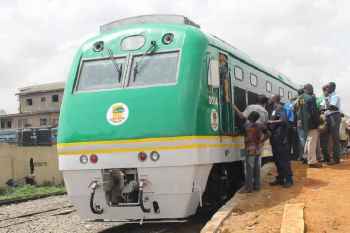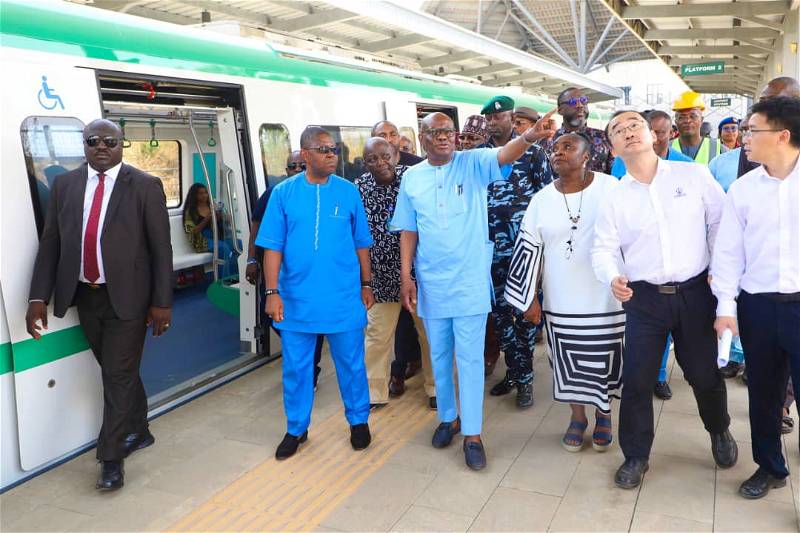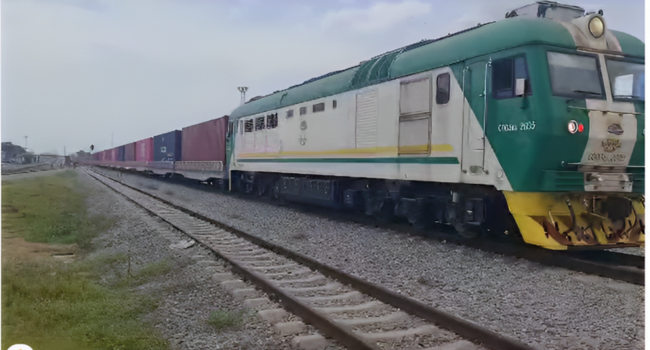Railway
Buhari inaugurates Itakpe-Ajaokuta-Warri Nigeria’s first standard gauge rail

President Muhammadu Buhari on Tuesday inaugurated the 326km Itakpe-Ajaokuta-Warri rail line for commercial operation and directed the Ministry of Transportation to ensure that all the nation’s ports are linked to the rail line.
He listed the ports to be linked to the rail network as Apapa, Tin Can, Warri, Onne and Calabar ports.
He also directed that the Itakpe-Warri rail line should be extended to the northern region of the country before the expiration of his tenure in 2023.
The Special Adviser to the President on Media and Publicity, Femi Adesina, disclosed these in a statement titled “After 30 years in limbo, President Buhari inaugurated 326Km Itakpe-Ajaokuta-Warri rail line for commercial operation.”
“At the virtual opening of the rail line linking Itakpe to Warri, President Buhari directed the Federal Ministry of Transportation to link all the nation’s ports of origin and destination – Apapa, Tin Can, Warri, Onne, Calabar Ports- to the rail network in order to significantly improve overall transportation and economic capacities.
“The President declared that his administration recognised the importance of the railway mode of transportation as a vital backbone to support industrialisation and economic development,” the statement read.
The President also said, “Accordingly, I have approved the prioritisation of viable railway routes for either new rail lines or the reconstruction and rehabilitation of some, to achieve effective and efficient train services supporting the country’s trade and commerce.
“The railway Infrastructure that I have the honour to commission today is the rail line from Itakpe via the steel town complex of Ajaokuta to Warri, and is an important link for the country’s economy as the central rail line.
“This government has also approved to link this line further from Itakpe to Abuja, thereby, connecting the northern zone of the country and also extending southwards to link the Warri ports.”
According to the statement, the President expressed confidence that the project, which serves as a vital link of South-South geopolitical zones of the country to the northern zones, would be completed during the tenure of this administration.
”It will link people across the cultural divides and expand the frontier of trade and commerce, which will lead to better standards of living for our citizens,” he said.
Buhari urged operators in the transportation industry, especially the railway subsector, to continue to support government in its stride to achieve other railway infrastructure projects.
He said, ”I implore those who work on this line to uphold maintenance and safety culture necessary for long-lasting service in this difficult terrain.
”By the same token, I urge other sectors who will be primary beneficiaries of this transportation backbone, including, the iron and steel sector, stakeholders in agricultural and mining sectors on this corridor, as well as the host communities to protect and sustain this infrastructure and maximize the benefits that could be derived from it and which is readily available at their doorsteps.
”This project will increase the volume of their trade and kick-start and resuscitate the iron and steel complexes.
”All these, I hope will improve our industrial potentials and capacities as well as boost employment,’’ he said.
Buhari said the new rail line was expected to move about one million passengers annually and 3.5 million tonnes capacity of freight.
He congratulated the Minister of Transportation, Rotimi Amaechi, and his team. on successfully completing the project.
He also commended the host communities for their cooperation during the completion work by the Federal Government.
He said that his administration would continue to judiciously connect commercial and industrial hubs to boost trade, generate wealth and create employment.
Railway
Our medical team tried to rescue policeman who died on Abuja-Kaduna train – NRC

Our medical team tried to rescue policeman who died on Abuja-Kaduna train – NRC
The Nigerian Railway Corporation has reacted to the death of policemen while on escort duty aboard the Abuja-Kaduna train on April 5, saying the deceased received medical attention on the train.
It said this in a statement on Tuesday.
The police escort attached to the train was said to have died on the train conveying passengers from Kaduna to Abuja last Thursday.
The police officer reportedly complained of chest pain before he collapsed and died.
Some have accused the NRC of not having medical personnel on board.
But the NRC said there was a medical doctor on duty on the train when the incident happened.
It disclosed that the official was also assisted by a passenger, also a medical practitioner.
The statement read in part, “The NRC management wishes to emphatically inform the general public that we have well trained medical personnel and equipped medical cubicle to attend to any emergency health challenges of our esteemed passengers.
“For the avoidance of doubt, the medical personnel on duty was Mariam Abdulai who was assisted by a good Samaritan medical practitioner that happens to be our passenger on board to revive the ailing cop but was in futility.
“The management of the NRC expresses its heartfelt condolence to the bereaved family of the late police inspector, Nambut Selbol, who was escort on duty in Abuja – Kaduna train service on that fateful day.”
Railway
Abuja metro rail 97% ready, says Wike after 30-minute ride

Wike in 30-min ride on Abuja metro train, says it’s 97% ready
Minister of the Federal Capital Territory (FCT), Nyesom Wike, on Friday undertook a 30-minute ride on the Abuja metro train after an inspection of the intra-city rail project.
The train ride was done after an inspection tour from the Metro Station in Central Area to the Nnamdi Azikiwe International Airport, Abuja.
He disclosed that the Rail Mass Transit (ART) project was 97 per cent ready.
Wike President Bola Tinubu would be happy to commission the Abuja Rail Mass Transit project in May.
The minister described the development as a “dream comes true”.
He said the project would be ready for inauguration to celebrate Tinubu’s one year in office.
Wike said Tinubu had approved the schedule for the inauguration of projects in the FCT.
The minister said, “We are very happy. We are almost 97 per cent completed. All works are ongoing to make sure that the May delivery date is a reality.
“I believe this is one of the projects Mr President would like to inaugurate, because it is very key to the development of the economy.
“For me, it is a dream come true, and we are happy that after all said and done, the metro line will be put to use for Nigerians, come May 29″.
After the test ride from the Metro Station to the Airport, the minister declared that it would be more convenient to use the train than vehicles to go to the airport.
He added, “I am really impressed with the contractor, China Civil Engineering Construction Corporation (CCECC).
“The company has assured us that all the renovation works on the stations will be ready before the commissioning date.”
Railway
Cargo trains lifted NRC revenue to N6.05bn in 2023 – NBS

Nigerian railway generated N6.05bn in 2023 – NBS report
The Nigerian Railway Corporation (NRC) generated a total revenue of N6.05 billion in 2023, largely buoyed by cargo trains.
This is an increase of 8.8 per cent over N5.56 billion recorded in 2022, according to latest report by the National Bureau of Statistic (NBS) on Rail Transport.
Despite the initial hiccups, since the Minister of Transportation, Senator Saidu Alkali, inaugurated the first cargo movement from the Lagos-Ibadan rail corridor in September last year, the freight train has enjoyed good patronage.
The NBS report showed the volume of cargo and revenue in 2023 rose by 102.04 percent and 144.32 percent respectively compared to the figures in 2022.
It specifically stated that the revenue generated in 2023 comprised N4.42 billion from passengers; N1.07 billion from cargos and N565.84 million from other income receipts.
The data also indicated that the number of cargos\goods transported by rail during the period stood at 317,244 tons while the number of passengers was 2.18 million tons.
However, the report showed that in Q4’23, the number of passengers fell by 49.7 percent to 672,198.
Part of the NBS report read, “In Q4’23, a total of 672,198 passengers travelled via rail system relative to 1,337,108 reported in the corresponding quarter of 2022, indicating a growth rate of -49.73 percent.
“The volume of goods/cargos transported in Q4’23 stood at 119,286 tons compared to 53,136 tons recorded in Q4’22.
“In terms of revenue generation, N1.07 billion was received from passengers during the reference period, showing a decrease of 7.51 percent from the N1.15 billion recorded in the same quarter of the previous year.
“Similarly, N423.22 million was collected from goods/cargos conveyed in Q4’23, up by 169.16 percent from N157.23 million received in Q4’22.
“In addition, other receipts amounted to N393.72 million, indicating an increase of 3.02 percent in Q4’23 from the N382.17 million collected in Q4’22.
“However, on an annual basis, the number of passengers in 2023 fell by 32.08 percent compared to the previous year.
“The revenue received from passengers declined by 2.64 percent in 2023, while volume of cargo and revenue rose by 102.04 percent and 144.32 percent respectively relative to 2022.”
-

 Sports7 days ago
Sports7 days agoKane’s three children involved in car crash, hospitalised
-

 News6 days ago
News6 days agoFG gives update on where fleeing Binance executive is hiding
-

 Entertainment6 days ago
Entertainment6 days agoTolani Baj expresses love for Bobrisky
-

 metro6 days ago
metro6 days agoTroops neutralise 188 terrorists, rescue 133 hostages in assault operations
-

 metro6 days ago
metro6 days agoViral video: Edo CP orders trial of officer threatening people with gun
-

 News5 days ago
News5 days agoNLC, TUC jointly propose N615,000 new minimum wage
-

 News7 days ago
News7 days agoNew electricity tariff may drop if naira rebounds further – Adelabu
-

 metro7 days ago
metro7 days agoBreaking: Bobrisky sentenced to six months imprisonment without option of fine























You must be logged in to post a comment Login